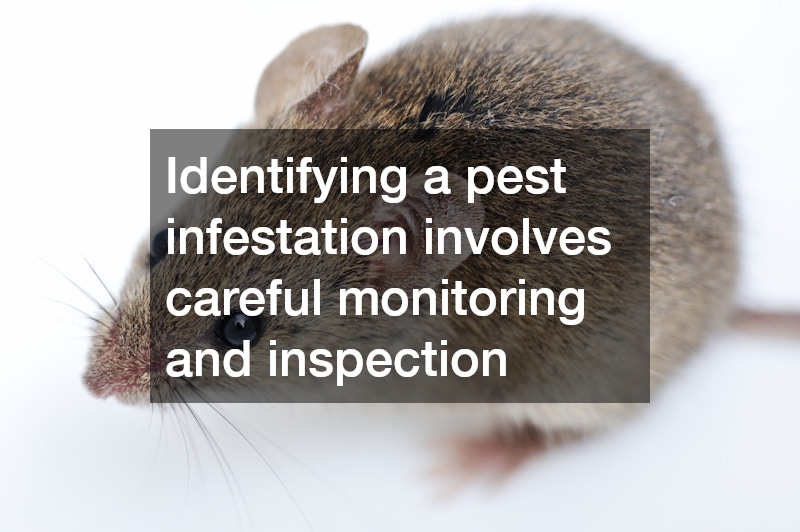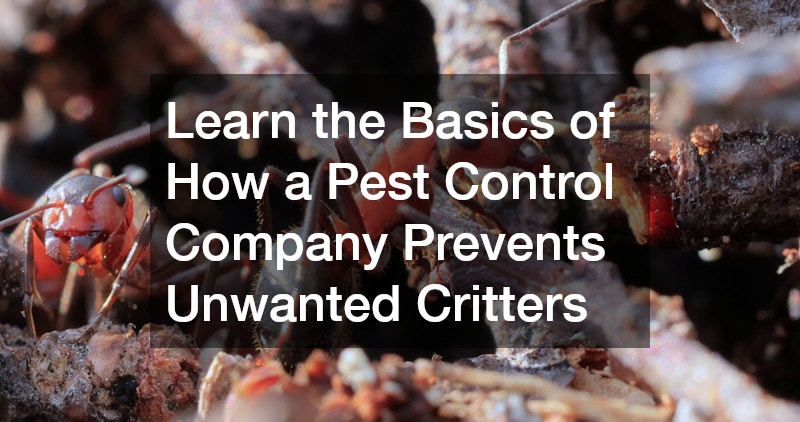A pest control company works hard to keep your homes and businesses free from unwanted critters. Learn the answers to some of the most frequently asked questions about pest control methods, strategies, and solutions.
What Types of Pests Do Pest Control Companies Handle?
Pest control companies address a wide range of pests, which can include insects like ants, cockroaches, and termites, as well as rodents such as rats and mice. These professionals are trained to identify and tackle both common and specialized pest issues that may arise in residential and commercial settings.
In some cases, pest control firms may also deal with wildlife, like raccoons or squirrels, that can invade your property.
The first step in pest management is identifying the type of pest, as different species may require unique methods of control. For instance, termite infestations are often treated through bait systems or liquid treatments, while rodent issues may need traps or exclusion techniques. Understanding the specific behavior and biology of each pest is essential for effective treatment.
Additionally, some pest control companies offer targeted services for particular pest problems. This allows homeowners and businesses to choose a service that meets their specific needs, such as mosquito control or bed bug treatment. A comprehensive understanding of various pests helps pest control companies provide specialized solutions to ensure the environment remains pest-free.
How Do Pest Control Companies Identify Pest Infestations?
Identifying a pest infestation involves careful monitoring and inspection by trained professionals. Pest control technicians often start by examining visible signs, such as droppings, nests, or physical damage to structures. They utilize their knowledge of pest behavior to determine the location of activities and potential nesting sites.
Another crucial aspect of pest identification is the use of technology. Many pest control companies employ state-of-the-art tools like thermal imaging cameras and moisture meters that help detect hidden infestations behind walls or in confined spaces. This advanced technology enhances their ability to find pests early before serious damage occurs.
Furthermore, pest control experts often conduct interviews with homeowners to gather information on recent sightings, unusual noises, or other factors that could indicate a pest issue. This collaborative approach ensures that technicians capture a complete picture of the situation, allowing for a more accurate assessment and tailored treatment plan to eliminate the pests effectively.
What Methods Do Pest Control Companies Use to Eliminate Pests?
Pest control companies utilize a variety of methods to eliminate pests, depending on the type and severity of the infestation. Common methods include chemical treatments with insecticides or rodenticides, which can be applied in different formulations like baits or sprays. The choice of pesticide often depends on local regulations and safety guidelines, ensuring that treatments are effective but safe.
In addition to chemical solutions, pest control professionals may employ physical methods, such as traps or barriers, to manage pest populations. For example, rodent traps can be strategically placed to capture mice, while exclusion techniques help seal entry points to prevent further incursions. This multifaceted approach is crucial for comprehensive pest control management.
Many pest control businesses are also increasingly incorporating Integrated Pest Management (IPM) practices. This involves using eco-friendly solutions and cultural techniques to minimize pest problems. By combining prevention, monitoring, and control strategies, pest control companies aim to achieve long-term success in eliminating pest issues in an environmentally responsible way.
Are Pest Control Treatments Safe for Your Family and Pets?
Safety is a top priority for most pest control companies when applying treatments in residential or commercial settings. Reputable services adhere to strict guidelines provided by governmental health and safety organizations to ensure that the products they use are approved and effective. Understanding these protocols is essential for customers concerned about potential risks.
Pest control professionals often conduct a thorough assessment of the space before applying treatments, taking into consideration the presence of children and pets. They provide guidance on how to prepare the home for treatment, including steps to protect vulnerable members of the household. Communication is key, allowing families to minimize exposure during and after the application.
Moreover, many companies now offer eco-friendly and non-toxic options for pest control, addressing the growing concern for health and environmental impact. Understanding the risks associated with different products allows families to make informed decisions when determining the right type of pest control for their specific situation.
How Can Homeowners Prevent Future Pest Infestations?
Prevention is often the most effective strategy for keeping unwanted pests at bay. Homeowners can implement routine maintenance measures such as sealing cracks and crevices in walls and foundations, ensuring that entry points for insects and rodents are minimized. Regular home inspections can highlight potential problem areas that may require attention.
Maintaining a clean living environment is equally important in deterring pests. Households should practice good sanitation habits, such as promptly cleaning up food spills and storing items in sealed containers. These simple housekeeping practices can significantly reduce the likelihood of attracting pests to the home.
Lastly, effective communication with pest control companies can enhance homeowners’ efforts in prevention. Pest control specialists can provide tailored advice and recommendations based on the unique characteristics of each property. By working together with professionals, homeowners can develop a proactive pest management plan that fits their specific needs and minimizes future infestations.
Understanding how pest control companies operate and the methods they use can empower homeowners to manage and prevent pest issues effectively. Regular communication with pest control professionals and proactive measures can lead to a pest-free environment.

